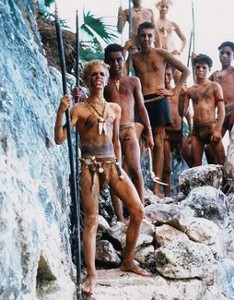
When I teach ancient lit, I have to cram 3000 years worth of culture, history, storytelling, geography, politics, art, religion, and on and on--all into fourteen weeks, give or take. It's a big task, hampered by the fact that, anything my students know about any of the works in question is usually heavily layered with a big fat "who cares?"
Gilgamesh? Who cares? Homer's Odyssey or Iliad? I had to read that in high school and couldn't get through it, I was so bored. Shakespeare? Really? You expect us to read that guy? These are the kinds of looks I get at the beginning of the semester. It's my job to change that attitude. I have to make books and poems from 2500 years ago interesting, relevant, and worth giving a damn.
Two of the many tools I use are humor (because, let's face it, whether it's in Chaucer or Captain Underpants, farts and poop are hilarious), and analogies to contemporary life.
These are some of the same things Vicky Alvear Shecter uses in
Alexander the Great Rocks the World, an emminently readable biography (and more) of Alexander the Great.
As a biography, it reads a little odd--Shecter uses a very conversational voice, filled with sarcasm and biting humor, to convey the story. She also lets you know what she thinks about these figures from ancient history. But here's why it works: she knows her stuff. She's very well read; the book is very well researched, and so you feel like your in strong and steady hands as she guides you through the details of history. And, because she's so up front about her views on how these figures played out, what history says about these events, and what scholarship is reliable or not, you as a reader feel like you're in a conversation with the author.
The art and spot illustrations are fun--kind of a
Mad Magazine's Dick Berg or Jack Davis sensibility to them--but sometimes can make you wince. And, I'll be honest, there are spots where the writing tries too hard to be hip, rather than relevant. Of course, that's more due to the aging of certain phrases and expressions(it was published nearly five years ago) than any actual problems with the book or writing style.
Overall, an enjoyable biography that opens up whole worlds of knowledge about Alexander's context, the social, political, and religious standards of his day, and how he revolutionized it all. Like all great biographies, it feels both intimate (you get a good sense of what made the world-conqeror tick) and epic. This is what's great about a writer who knows their stuff and works hard to draw you into a dialogue with their subject--you become a more active reader, which means you have to figure out why the material is worth giving a damn.


 “Then in the shadowy solitude my longing for light grew so frantic that I could rest no more, and I lifted entreating hands to the single black ruined tower that reached above the forest into the unknown outer sky. And at last I resolved to scale that tower, fall though I might; since it were better to glimpse the sky and perish, than to live without ever beholding day.”
“Then in the shadowy solitude my longing for light grew so frantic that I could rest no more, and I lifted entreating hands to the single black ruined tower that reached above the forest into the unknown outer sky. And at last I resolved to scale that tower, fall though I might; since it were better to glimpse the sky and perish, than to live without ever beholding day.”









